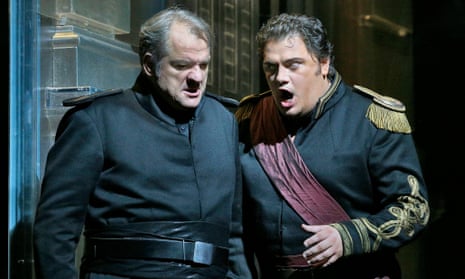For director Bartlett Sher, the decision not to use blackface in his new production of Otello that opened this week at the Metropolitan Opera in New York “wasn’t all that complicated”.
“It really did seem very obvious given our cultural history and political history in the United States, that for me and my production team the idea of putting [Othello] in blackface was completely unthinkable,” he said. “We can’t give in to that cultural trope.”
Despite this, the idea of not putting the character of Otello – described, like Shakespeare’s Othello, as a “moor” – in black makeup is still a bizarrely groundbreaking one. When the English National Opera put the opera on in 2014, tenor Stuart Skelton was the first in any major opera company at any time to play the role without blackface.
For Aleksandrs Antonenko, the Latvian spinto tenor who is playing Otello at the Met – a specialist in the role, who has sung Otello at Dresden, Salzburg, Vienna, Covent Garden and Paris – this production marks the first time he has ever performed the role without blackface makeup.
Partly this is because the world of opera moves “glacially slowly”, said Wendy Heller, professor of music at Princeton. And while the use of blackface in productions of Shakespeare’s Othello in theatres died out many years ago, its use in Verdi’s opera is still near-ubiquitous.
On top of that, the Met is known as one of the most conservative institutions, in an industry which is in many ways already very resistant to change at its upper echelons.
“It’s been an automatic thing, particularly for the Met, which has tended to be very traditional in how they’ve done things,” Heller said. “They’re following the tradition of all the great Otellos – when you look at all these great singers who’ve done the role, they’re all in blackface.”
The controversy over this particular production may have begun when the Met’s season-book blithely carried a picture of Otello in blackface on its cover, which caused a flurry of outrage.
In a year in which the national conversation has re-examined attitudes toward civil rights in America, the apparent lack of thought seemed insensitive at best.
Generally, experts told the Guardian that it has previously been “practically automatic” for singers playing the part to use blackface – just as extravagant Asian-style makeup known as “yellowface” is still the norm for productions of Madama Butterfly.
“The sort of visual worlds that are being represented are very fixed in a certain way,” said Dr Arman Schwartz, a musicologist at the University of Birmingham who researches modernism and modernity in opera. “I also feel like a work like Otello hasn’t been at the forefront of innovative operatic productions,” he added.
Partly this is because Otello is an extremely complex, taxing, virtuosic production to put on. Very few smaller opera companies – which tend to be more conceptually adventurous and forward-thinking – have the resources to stage it.
The title role is also a fantastically difficult part to sing; Schwartz estimated that there are at any one time only five singers in the world capable of playing the role. Sher, the director of the Met production, put the number at only two or three.
Naomi Andre is an associate professor in women’s studies at the University of Michigan, and was the lead editor of a collection of essays titled Blackness in Opera. She remembered going to the Met in the 1980s to see the famous tenor John Vickers play the title role in Otello – in blackface – and how it made her feel as a woman of colour. “It was odd. I still noticed it, but it wasn’t something that I needed to talk about out loud,” she said. “I needed to process it internally.”
Also problematic is a dearth of people of colour entering the opera world as singers at most levels. “There are extremely famous African American singers, and has been for a few generations,” Schwartz said, “but there aren’t very many of them.”
Andre agreed. “It’s not that there are no black people who can do it – [it’s that] there’s no pipeline for black people to get the training, and get on those stages,” she said. “I wish this was more of a focus for these opera companies.” She said that she hoped the Met and the English National Opera would set an example that other companies could follow.
“For those who want to pretend that this is political correctness, and doesn’t matter, I strongly disagree,” Andre said. “These things do matter. These things were written in the past, but they live into the future. They are reinvented every time they are performed; you have people giving it life.
“It has a new meaning each time it is performed – or at least the possibility of new meaning,” she added. “So I think it is entirely appropriate, in 2015, for the Metropolitan Opera to be thoughtful about it.”
- This piece was amended on 22 September 2015; the decision not to use ‘blackface’ in this production was director Bartlett Sher’s, not Met chair Peter Gelb’s.

Comments (…)
Sign in or create your Guardian account to join the discussion